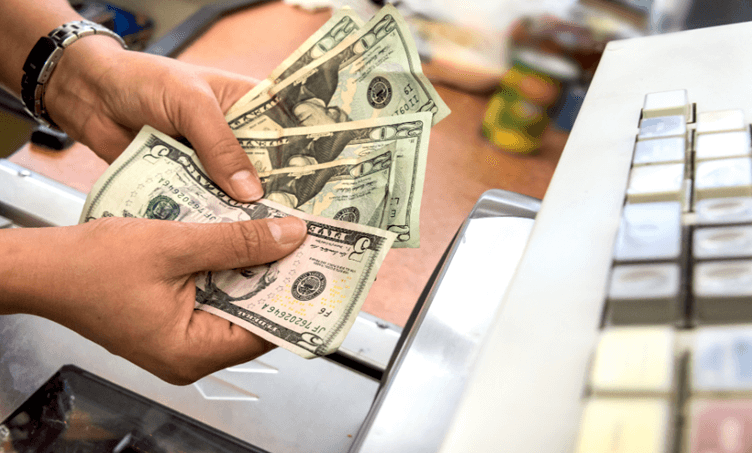In today’s world, cashless transactions have become increasingly popular. However, despite this growing trend, successful businesses still operate solely on cash payments. For smaller businesses, there are distinct advantages to running a cash-only business, even in the present era. Nevertheless, it is essential for cash-only businesses to be aware of certain industry secrets that can help them ensure smooth operations, minimize risks, and fully maximize profits.
How to Run Your Cash Only Business – 4 Easy Steps

1. Keep Customers Informed
If a customer does not realize that your company only accepts cash and they do not have any on hand, things could become messy. So, keep your customers informed by implementing the following guidelines.
- Inform customers in advance about your cash-only policy.
- Place clear signs both outside and inside your business premises.
- Train employees to remind customers about the cash-only policy before starting transactions.
- Utilize online and social media channels to communicate the cash-only policy.
- Update your website and social media profiles to emphasize that your business does not accept credit or debit cards.
- Consider including the cash-only policy in any advertising or promotional materials.
- Respond promptly to any inquiries or questions about payment options to avoid confusion or surprises for customers.
2. Provide Employees with Special Training
Cash-only businesses will frequently require employees to receive special training on managing significant quantities of cash.
Managers can provide their employees with the following training recommendations and resources:
- Employees should be given risk-aversion training on how to identify counterfeit money.
- There are special pens available that can aid in detection.
- Employees should be educated to make only one transaction at the cash register at a time and not to be distracted while doing so. When trying to multitask, it is simple to give a customer the wrong change or mix up the transactions of two or more customers.
- Employees at a cash-only business should be instructed to stay focused and to adhere to a specified company policy.
3. Maintain Accurate Records
Keeping accurate records helps reduce business costs and prevents financial errors, including payroll mistakes, so maintain accurate and detailed financial records by implementing these tips.
- Implement proper record-keeping practices, even if manual counting is required.
- Generate receipts for every sale made during the day to track income.
- Regularly reconcile cash in the register against the receipts to identify any discrepancies or errors.
- Use record-keeping to detect potential employee theft or mistakes in calculating change.
4. Follow IRS Rules
To comply with IRS regulations, it is necessary to complete Form 8300 when a customer makes a cash payment of over $10,000 in a single transaction or through multiple related transactions.
- Fill in the customer’s details, transaction description, and your business information on Form 8300.
- Submit Form 8300 electronically or via mail, ensuring it is filed by the 15th day after receiving the large cash payment.
- Provide a written statement to the customer named on Form 8300 no later than January 31 following the transaction.
What is Cash Only Business?

A cash-only business exclusively conducts transactions using cash as the accepted form of payment. Such businesses typically do not accept checks, debit or credit cards, money orders, credit, or mobile wallets. In a cash-only model, cash is often the primary method used for vendor payments as well.
Running a cash-only business is a legitimate choice for entrepreneurs, as there are no federal laws mandating the acceptance of alternative payment methods from customers.
Certain industries commonly adopt a cash-only approach. Examples of cash-only businesses include restaurants, coffee shops, street vendors, lawn services, babysitters, vending machines, and laundromats. These types of businesses generally do not accept credit cards, ensuring that customers are aware in advance that cash payment is required.
Pros and Cons of a Cash only Business
Pros
Accepting only cash payments in a small business offers several advantages:
No credit card fees: small businesses with low-priced products can avoid the burden of credit card fees, which can be costly. By accepting only cash, there are no additional fees involved, saving money for both the business and its customers.
Immediate receipt of funds: Cash payments provide immediate access to funds. There is no need to wait for payments or chase down customers for payment, as the business receives money at the time of the transaction.
Elimination of chargeback risk: Cash-only businesses are not susceptible to chargebacks, which occur in credit card transactions when a customer disputes a charge and demands a refund. By accepting cash only, the business avoids the potential loss of money and time associated with chargebacks and fraudulent activities.
Cons
While cash-only businesses offer some advantages, there are notable disadvantages as well:
Inconvenience to customers and potential sales loss: Limiting payment options to cash can inconvenience customers who prefer using debit or credit cards. This may deter potential buyers and discourage larger purchases, ultimately affecting cash flow and sales.
Increased security risks: Accepting only cash exposes the business to security risks such as theft and counterfeiting. Having a significant amount of cash on-site can make the business a target for thieves, and it becomes harder to track employee theft. Additionally, cash transactions increase the likelihood of accepting counterfeit money.
Higher risk of IRS audit: Cash-only businesses face a greater risk of IRS audits due to the difficulty in maintaining organized and traceable records. The lack of a clear paper trail can raise suspicions of income omission and potential tax evasion.
Why One Should Consider Starting a Cash Only Business
Here are some benefits of owning a cash-only business for collecting payments:
Convenience for customers: Paying with cash offers a straightforward and convenient payment method for customers, avoiding the need to search for wallets or cards during transactions.
Elimination of credit card fraud risk: By not accepting credit cards, cash-only businesses can completely eliminate the potential risk of credit card fraud, safeguarding their finances.
Eliminates processing fees: Cash businesses can save money by avoiding credit card processing fees, allowing them to retain a larger portion of their earnings and improve profitability.
Enhanced control: When you solely handle cash payments, you have full control over the financial aspect of your business. This control provides increased flexibility and freedom in making decisions that impact your company’s operations.
Simplified setup: Starting a cash-only business requires minimal setup. All you need is a cash register and a secure location to store the collected money. Additionally, displaying a prominent “cash only” sign helps inform customers upfront about the payment method accepted.
Best Cash Only Businesses to Consider
Here are a few suggestions to get you started if you’re seeking for profitable cash business ideas. These businesses are ideal for offering one-on-one customer service because they let you concentrate on giving good service and developing reliable connections.
- Tutoring Business
- Delivery Service
- Landscaping Business
- Pet Grooming Business
- Food Truck Business
- Estate Sale Service
- Pet Sitting Services
- Small Local Gift Shop
- Yard Clean up Services
- Farmers Market Vendor
Frequently Asked Question
What are the risks of cash-only business?
Large cash transactions put businesses at greater danger of theft and break-ins, thus it’s critical for cash-only businesses to practise extreme security vigilance. You’ll probably have to invest more time, money, and effort to keep everything secure if you accept solely cash.
Is cash-only a good idea?
When you exclusively use the money, you currently possess, you naturally become more deliberate in your spending habits. This means that purchases are carefully planned, and there is a greater inclination to save for specific goals, knowing that cash will be the sole payment method.
Are Cash Only Businesses Profitable?
Profitability in a cash-only business relies on consistent payments from loyal, repeat customers. To achieve this, the business must offer desirable products or services while maintaining low costs. Additionally, having a dedicated customer base willing to regularly spend their money at the establishment is advantageous for cash-only businesses.
Is cash only businesses legal?
Cash-only businesses operate within the bounds of the law. However, they may involve higher risks compared to other types of businesses. It is crucial to maintain meticulous and precise records that accurately document all purchases, business expenses, employee payroll, and payment methods for employees.
Conclusion
Running a cash-only business has its advantages and disadvantages, as discussed. While avoiding credit card fees and enjoying immediate payments may be appealing, it’s essential to consider customer convenience and financial security. Therefore, it’s important to make a thoughtful decision about whether to adopt a cash-only approach or incorporate digital payment methods.

